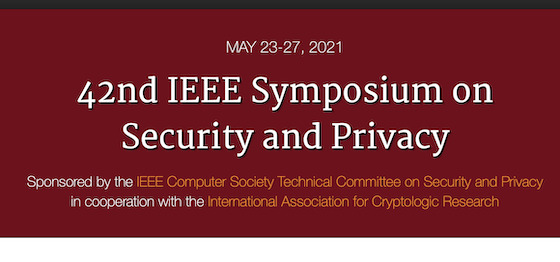The 42nd IEEE Symposium on Security and Privacy have recently published the list of accepted papers for the conference that will take place from the 23rd to 27th of May. We are happy to announce that six papers from researchers of the IMDEA Software Institute are between them.
Since 1980, the IEEE Symposium on Security and Privacy has been the premier forum for presenting developments in computer security and electronic privacy, and for bringing together researchers and practitioners in the field. The 2021 Symposium will mark the 42nd annual meeting of this flagship conference, sponsored by the IEEE Computer Society Technical Committee on Security and Privacy in cooperation with the International Association for Cryptologic Research.
The following papers have been accepted:
A2L: Anonymous Atomic Locks for Scalability in Payment Channel Hubs
Erkan Tairi (TU Wien), Pedro Moreno-Sanchez (IMDEA Software Institute), Matteo Maffei (TU Wien).
Hardware-Software Contracts for Secure Speculation
Marco Guarnieri (IMDEA Software Institute), Boris Köpf (Microsoft Research), Jan Reineke (Saarland University), Pepe Vila (IMDEA Software Institute).
High-Assurance Cryptography in the Spectre Era
Gilles Barthe (Max Planck Institute for Security and Privacy and IMDEA Software Institute), Sunjay Cauligi (University of California San Diego), Benjamin Gregoire (INRIA Sophia Antipolis), Adrien Koutsos (Max Planck Institute for Security and Privacy), Kevin Liao (Max Planck Institute for Security and Privacy and Massachusetts Institute of Technology), Tiago Oliveira (University of Porto (FCUP) and INESC TEC), Swarn Priya (Purdue University), Tamara Rezk (INRIA Sophia Antipolis), Peter Schwabe (Max Planck Institute for Security and Privacy).
How Did That Get In My Phone? Unwanted App Distribution on Android Devices Stephan van Schaik (University of Michigan), Marina Minkin (University of Michigan), Andrew Kwong (University of Michigan), Daniel Genkin (University of Michigan), Yuval Yarom (University of Adelaide and Data61), Platon Kotzias (NortonLifelock Research Group), Juan Caballero (IMDEA Software Institute), Leyla Bilge (NortonLifelock Research Group).
SoK: Computer-Aided Cryptography
Manuel Barbosa (University of Porto and INESC TEC), Gilles Barthe (Max Planck Institute for Security and Privacy; IMDEA Software Institute), Karthik Bhargavan (INRIA Paris), Bruno Blanchet (INRIA Paris), Cas Cremers (CISPA Helmholtz Center for Information Security), Kevin Liao (Max Planck Institute for Security and Privacy; Massachusetts Institute of Technology), Bryan Parno (Carnegie Mellon University).
Bitcoin-Compatible Virtual Channels Lukas Aumayr (Technische Universität Wien), Oguzhan Ersoy (Delft University of Technology), Andreas Erwig (Technische Universität Darmstadt), Sebastian Faust (Technische Universität Darmstadt), Kristina Hostáková (ETH Zürich), Matteo Maffei (Technische Universität Wien), Pedro Moreno-Sanchez (Technische Universität Wien; IMDEA Software Institute), Siavash Riahi (Technische Universität Darmstadt).
